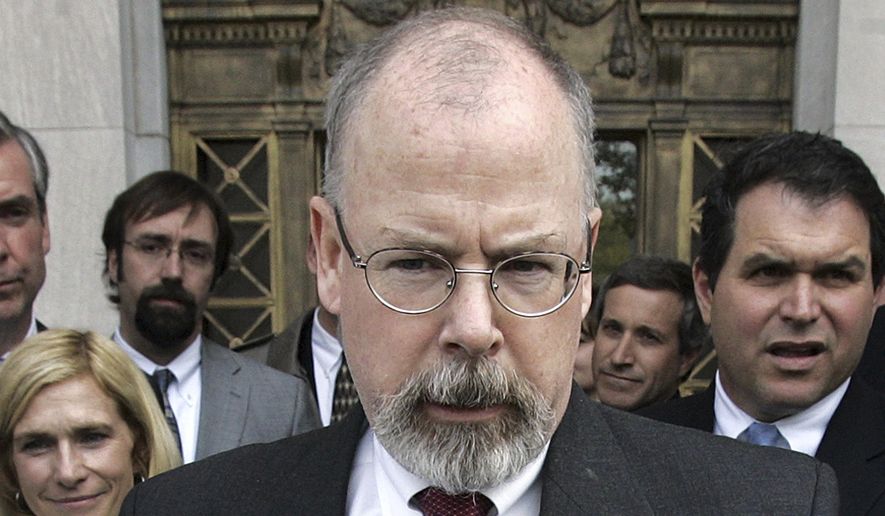A federal judge will decide Friday whether to send former FBI lawyer Kevin Clinesmith to prison for lying so the agency could continue court-approved spying on a 2016 Trump campaign aide.
To the chagrin of conservatives and other allies of former President Donald Trump, the case’s closure also could be the last word from special counsel John Durham’s probe.
Mr. Durham’s nearly two-year investigation into the origins of the Trump-Russia collusion probe has disappointed those who hoped he would shed light on wrongdoing by the FBI and Justice Department.
So far, Clinesmith is the only person hit with criminal charges brought by Mr. Durham, who is the U.S. attorney for Connecticut. Mr. Durham has also not released a report on his findings.
That’s not enough, conservative activists say.
“If you look at the wrongdoing, the abuse of power that has taken place, people will feel very unsatisfied if only Clinesmith is charged,” said Curt Levey, president of the conservative Committee for Justice.
Others have dismissed the Clinesmith case as low-hanging fruit, noting that his criminal conduct was uncovered by the Justice Department inspector general nearly a year before Mr. Durham filed his charges.
“Yes, my conservative colleagues and I will be disappointed if there are no more charges brought,” Mr. Levey continued. “There are certainly people who should be held accountable and go to jail.”
Clinesmith last year pleaded guilty to one count of making a false statement, a crime punishable with up to five years in prison.
Prosecutors have asked U.S. District Judge James Boasberg to sentence Clinesmith to six months in prison. They’ve argued his “political or personal bias” against Mr. Trump motivated him to falsify an email that continued the unjustified surveillance of Trump campaign aide Carter Page.
“This Court’s sentence should send a message that people like the defendant — an attorney in a position of trust who others relied upon — will face serious consequences if they commit crimes that result in material misstatements or missions to a court,” prosecutors wrote in a court filing.
Clinesmith’s legal team is seeking probation, acknowledging that he committed a crime, but insisted he did not mean to mislead investigators.
“Kevin Clinesmith made a grievous mistake. By altering a colleague’s email, he cut a corner in a job that required far better of him. He failed to live up to the FBI’s and his own high standards of conduct,” his attorneys wrote in a sentencing memorandum.
Kendall Coffey, a former U.S. attorney for Southern Florida, said he expects Judge Boasberg to hand down at least some prison time.
“I think a judge focused on deterrence would want there to be some incarceration,” he said. “It doesn’t take a lot to make a point that we can’t allow these submissions to have a compromised integrity.”
In his guilty plea, Clinesmith admitted to altering an email in early 2017 to say Trump campaign aide Carter Page was not a source for the CIA, when, in fact, he was.
The false assertion was used by the Justice Department to obtain the third Foreign Intelligence Surveillance Act warrant for Mr. Page. While in contact with what appeared to be the FBI’s liaison to the CIA, Clinesmith was informed via email that Mr. Page was indeed a source for the CIA.
Clinesmith then altered the email by inserting the word “not” next to “source,” making it appear as if Mr. Page had no relationship with the CIA.
Clinesmith had served as an attorney with the FBI’s National Security and Cyber Law Branch. He worked under former FBI General Counsel James Baker and reported to disgraced anti-Trump FBI agent Peter Strzok during the Clinton email investigation.
Mr. Page is expected to address the court tomorrow, describing the injuries his reputation suffered because of illegal surveillance.
Mr. Page did not respond to a request for comment from The Washington Times.
Testimony from Mr. Page will likely not have much of an impact on Clinesmith’s sentencing, Mr. Coffey said.
“At most, it would have a modest influence on the margins, but Page isn’t going to add new information,” he said.
“I think the judge is going to look at Clinesmith’s crime, not in the context of Carter Page or a particular investigation, but the transcendent issue of the integrity of the applications that intrude on people’s lives and privacy,” he said.
• Jeff Mordock can be reached at jmordock@washingtontimes.com.




Please read our comment policy before commenting.